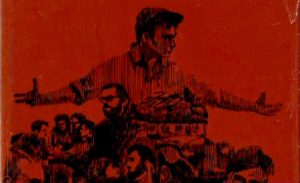I sat down to write this as a commentary on the series of books edited by John Zorn, all of which are entitled Arcana. The series comes in six parts, including hundreds of essays written by musicians, artists, on their creative process, technique, philosophy, social commentary, and more. Some artists address alternate technique discussion, others essays on a unique approach to composition, others choose to illuminate musics of cultures and traditions outside of the western way of organizing sound. Each piece, ranging from a few pages to upwards of 20, is poignant, important, and ultimately beautiful.
 There were no rules in the writing. The aim, as I take it, was to inspire the reader by means of allowing some of the world’s most original and poignant thinkers, most of whom have their work shadowed by the big big machine song, to share their experience and perspective. The result is six volumes of reasons to be proud to be human. We’re still out there making new, hopeful, bright and true happen.
There were no rules in the writing. The aim, as I take it, was to inspire the reader by means of allowing some of the world’s most original and poignant thinkers, most of whom have their work shadowed by the big big machine song, to share their experience and perspective. The result is six volumes of reasons to be proud to be human. We’re still out there making new, hopeful, bright and true happen.
As opposed to comment on the book, I decided that perhaps a reader, and the spirit of the Arcana series itself, would be better served by a piece of writing the books encouraged. These books are far too important to excerpt from. They deserve our attention, consideration, and our action.
FROGs
There is this non-biblical parable often referenced in Mexico where I live to explain the defeatist social phenomenon that keeps us from encouraging the success (nonobjective term) of others, or if not success, at the very least, the happiness of others. The phenomenon is born of insecurity and envy, ultimately fear. It is destructive, and it is very much where we stand as a society. In the hip hop community, now more widely, it is commonly referred to as hatin’.
There is a bucket full of frogs. The bucket rises just above knee high – a commoner’s knees – , similar to one you would find in a horse stall. It can be any color. There are fourteen frogs in the bucket. Mostly they spend their time thinking, as individuals, how to transcend their bucketed lives. They want out. Grass and making night noises on little ponds in spring times. Making small frogs.
They do the obvious, they jump, and fall. Over time some gain strength in their frog legs. They jump higher, closer to the imperfectly, yet gently, curved top of the container. Not all the frogs have yet developed this strength, nor the desire, the will, nor the voracity in thought that constant jumping, and falling, requires. It takes persistence, commitment, and discipline. The frogs that hang down low where the bucket’s end rolls, the embittered, they see no hope of making it out. The rim is too high. They worry that others will make it out and they will not. They bat their slow, calculated eyelids at the strong-calved flock of jumpers. They watch the bold get closer and closer to escape.
One day they are awoken by the sound of frog chin on rim. Its a gentle clip, not a thud really. Its the sound of hope for someone. Someone else hears it and their blood drops to their slippery toes. Gravity. White face frog. Scare. A co-habitant of the bucket is almost no longer. Nearly gone. Perhaps a few more jumps and they will be out to the great unknown some chatter their tongues at. But it must be a better life, speaking objectively. Fear talk can tell another story, but that is another story.
So the nearly fortunate frog falls back to his plastic Earth. He and a mate look at each other. They both know of each other, and despite exchanging pleasantries, or feigning ignorance as to each other’s existence, they know a lot about what one thinks of the other. The old frog jumps. he is flying. Almost. The bucket, as he slowly rises, falls below his periphery. Nearly free. This is the hop. Almost. His co-habitant, that other cat down at the bottom jumps behind. He cannot reach as high as his neighbor. But his leap allows him just enough height. Just high enough. High enough to take his little gentle frog mouth and do a big brash thing. He catches the last little toe, the dangling foot, of his old, more physically able, friend foe and snaps his joe, takes hold, and pulls our nearly free frog back to Earth.
If he wasn’t going, no one was. And now no one is. And there is no big bright out there any longer. It fades to talk. You can’t go. They catch you. Beacause we catch you. We catch we. And no one succeeds at what one cannot, even if that inability was only temporary, it is now permanent.
The shortsightedness of our frog below, the mild leaper who caught the great dreamer, has rubbled the dreams of his neighbor, and ironically, of himself. One day he will be that able jumper. But we don’t let our own go any longer. Safety in numbers means fear of other. So here we all are. Stuck in this bucket. Assuring no one transcends the little blue bowl we’ve been confined to.
– So that’s the story, in color. We can all deduce what we will from it, and my veiled commentary. But what I’m interested in speaking about is empowerment. Celebrating possibility. Encouraging questioning. This is the common thread of the Arcana series. Big questions. Being reckless on occasion. Taking the academic out of our lives. Creating new academia. Liberating ourselves from should, from need, from acceptance.
Empower. Make something up, get behind, and love it. Love what others make up. It will allow you to love what you do. Celebrate our capacity to think for ourselves, like ourselves, on our terms – die should die. Punctuate creatively if you’d like. It’s not reactionary, its not hate, and it doesn’t make you stupid. It makes you you. That’s what we all need.
[View the Arcana series and learn more on John Zorn and his work.]




Leave a Reply